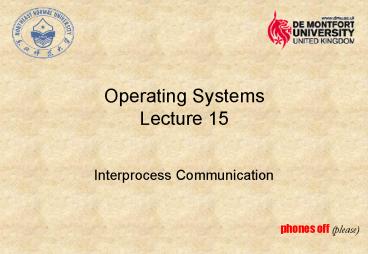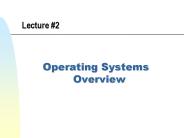Operating Systems Lecture 15 - PowerPoint PPT Presentation
1 / 21
Title:
Operating Systems Lecture 15
Description:
applications constructed as a set of co-operating processes. NENU - Operating Systems - Lecture 15 ... There are several reasons for co-operating. information sharing ... – PowerPoint PPT presentation
Number of Views:24
Avg rating:3.0/5.0
Title: Operating Systems Lecture 15
1
Operating SystemsLecture 15
- Interprocess Communication
phones off (please)
2
Overview
- Interprocess synchronisation
- race conditions
- critical sections
- deadlocks
- The dining philosophers problem
- deadlock
- starvation
3
Interprocess Synchronisation
4
Basic Principles
- In the earlier discussion of processes, we have
glossed over the significance and ramifications
of the co-existence of processes within a system - Several possible relationships between processes
- fully independent processes
- users working on separate applications within one
system - students compiling and running C programs in lab
sessions - independent but related processes
- users contributing to one application
- data entry clerks adding orders to sales control
system - concurrent programming applications
- applications constructed as a set of co-operating
processes
5
Shared Resources
- Processes need to share resources
- physical resources
- processor, memory, I/O devices, disks, etc.
- logical resources
- data items such as message queues, data
structures, etc. - In general, resources can be classified as
- reusable
- not destroyed by being used
- processor, memory, etc.
- consumable
- transient data item or signal
- a message sent between one process and another
6
Interprocess Communication
- In a real system processes need to communicate
with each other in order to co-operate - There are several reasons for co-operating
- information sharing
- the processes are interested in the same
information - computational speedup
- a particular task may run faster if it can be
broken down into multiple subtasks which run in
parallel - modularity
- may be carried out as a design requirement
- convenience
- an individual user may choose to work on many
tasks at once
7
Synchronisation Problems
- As soon as we allow multiple processes to share
resources and communicate, there are a number of
potential process synchronisation problems that
may occur - race conditions
- two or more processes competing for a shared
resource - the result varies according to the order of
process execution - deadlocks
- a situation where two or more processes are each
waiting for resources held by others - starvation
- a process never gets access to a required resource
8
Recall
- Imagine an operating system has a print spooler
- when a process wants to print a file it enters
the file name in a special spool directory - the directory has numbered slots (spaces) for
file names - another process (the spooler demon) periodically
checks to see if there are any files to be
printed - the operating system maintains two variables
- out holds the number of the next file to be
printed - in holds the number of the next free slot
- Now imagine two processes trying to print a file
at the same time - each needs to submit the file name to the spool
queue
9
A Race
out 4
in 7
in 8
in 8
The operating systemis now in a
consistentstate, but B.doc willnever get
printed
process A
process A
in 7
in 8
B.doc
A.doc
This is called a race condition - theresult
will depend ona race between thetwo processes
process B
in 7
in 8
10
Critical Sections
- How do we avoid race conditions?
- the problem is caused by two processes having
free (simultaneous) access to a shared resource - the data item in in the example just seen
- We need to find some way to prohibit more than
one process from accessing such a resource - problems only occur during shared resource access
- The part of the process which accesses a shared
resource is termed a critical section - only one process must be allowed to be in a
critical section at one time this is mutual
exclusion
11
Example of Critical Sections
1. Process A starts to run
2. Neither process is in a critical section, so
A is allowed to enter its
3. Process B starts to run
4. Process B reaches itscritical section, but is
notallowed to enter - the process blocks
5. Process A is reactivated and leaves critical
section
6. Process B is reactivated and is now allowed
to enter its critical section
Process A
Process A
Process B
Process B
Process A
Process A
Process B
12
Flawed Attempt at Mutual Exclusion
- Lets try an obvious solution to achieve mutual
exclusion, by setting a critical_region flag
while ( critical_region BUSY
) do_nothing critical_region BUSY ltdo
critical codegt critical_region FREE
- Unfortunately, this doesnt solve the problem!
- suppose process A is interrupted just after it
has checked that the critical_region flag is
FREE, but before it has run the next line to set
it to BUSY - process B then runs and checks the
critical_region flag - it finds it FREE, and it too enters the critical
code region
13
Requirements for Solution
- The actual requirements needed for a correct and
efficient solution to the mutual exclusion
problem are far from obvious - no two processes may be in their critical section
at the same time - no assumptions may be made about speeds or the
number of processors - no process running outside its critical section
may block other processes - no process should have to wait forever to enter
its critical section
14
Deadlocks
- Even if the mutual exclusion problem is solved,
there is another related problem deadlocks - In many cases a process needs exclusive access to
more than one resource - suppose there are two processes, A and B, and two
shared resources, printer and tape - A allocates the printer
- B allocates the tape
- then
- A requests the tape and blocks until B releases
it - and then
- B requests the printer and blocks until A
releases it
15
The Dining Philosophers
- A Problem ofInterprocess Communication
16
The Dining Philosophers
- Five philosophers are sat around a table to eat
- there are only five spoons
- two (left right) are needed to eat
- A philosopher thinks eats
- and nothing else!
- After thinking for a while,a philosopher tries
to pickup left right spoon - If successful, they eat for a whilethen put down
the spoons - How can this problem be solved?
17
A Proposed Solution
while ( TRUE ) think() take_spoon(i) take_s
poon((i 1) mod 5) eat() put_spoon(i) put_s
poon((i 1) mod 5)
- The functions perform the following actions
- think performs whatever action(s) thinking
involves - take_spoon waits until spoon is available, then
takes it - eat performs whatever action(s) eating involves
- put_spoon puts a spoon back on the table after
use
18
Deadlock
- Unfortunately this first proposed solution is
wrong! - The solution suffers from deadlock
- Suppose all five philosophers happen to run at
the same time - each philosopher picks up the left-hand spoon
- each philosopher will then enter take_spoon to
obtain the right-hand and will wait for it to
become available - all philosophers wait for each other
- there is no provision for giving up the wait
19
Starvation
- Lets try to improve the deadlock situation by
not blocking if one spoon is not available - check left is free if so, pick it up check
right pick up - if not, release any spoons being held and try
again - Consider the following situation
- each philosopher in turn picks up left hand spoon
- the right hand spoon is not available
- each philosopher puts down the left hand spoon
- now loop around again!
- This situation is called starvation
- processes continue to run, but one() never
progress
20
Another Proposal
- The starvation problem seems to occur if all
philosophers keep picking up the left-hand spoon
and releasing it in perfect synchronisation - so lets solve the problem by adding a random
amount of time after failing to acquire the
right-hand spoon - the chances of the simultaneous locking
continuing for any length of time are minuscule - this must work eventually
- This solution will work in practice
- however, it is not completely satisfactory
- particularly in time-critical or safety-critical
applications
21
Summary
- Interprocess synchronisation
- race conditions
- critical sections
- deadlocks
- The dining philosophers problem
- deadlock
- starvation































